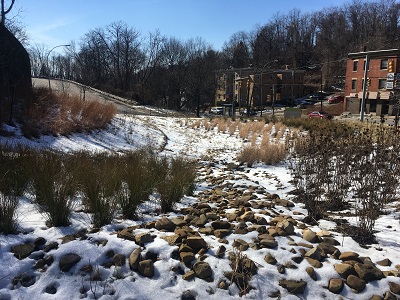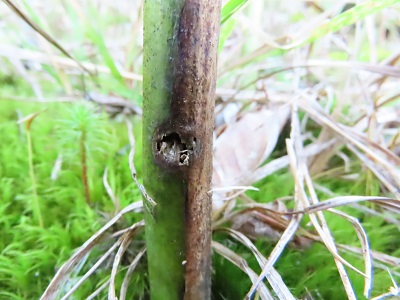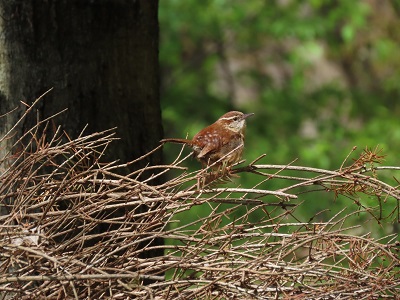When we consider the ways insects benefit from plants, we often imagine pollen-coated bees drowsily buzzing on echinacea and butterflies flitting from milkweed to Joe Pye weed, seeking nutritious nectar under the warm summer sun.
flitting from milkweed to Joe Pye weed, seeking nutritious nectar under the warm summer sun.
However, pollinating insects benefit from plants during winter too. “Most butterflies and moths overwinter as a caterpillar or pupae,” explains Betsy Leppo, WPC’s invertebrate zoologist with the Pennsylvania Natural Heritage Program. “The generation that matures in late summer lays eggs that hatch, become pupae and overwinter in leaf litter and your garden’s spent flower stems, grasses and leaves.” Other insects, such as some bees, also overwinter in the garden.
That is why it is a good idea to leave perennial plants in your garden during the cold months. “Keep a messy yard for those stem nesters,” Betsy says. “Even during winter, plant stems will host bee or other insect larvae. If possible, don’t cut them until late spring.”
 But what if you prefer a tidy garden during winter? “It is okay!” says Betsy. “Many insects will visit the flowers in a garden, then go elsewhere to lay eggs, construct a nest or overwinter. It just depends on what resources are available in the garden.”
But what if you prefer a tidy garden during winter? “It is okay!” says Betsy. “Many insects will visit the flowers in a garden, then go elsewhere to lay eggs, construct a nest or overwinter. It just depends on what resources are available in the garden.”
If you want to clean your garden yet provide stems for stem nesters, and have extra space in your yard as Betsy does, you can make some loosely stacked brush piles from stem cuttings of dead perennials and shrubs during fall or spring. “Avoid using heavy material such as leaves or grass clippings to top the pile,” Betsy says. “If there is something attached to or inside the stem, it still has a chance to emerge when conditions are right.”
Brush Pile Bonus: “Carolina wrens really love any kind of airy stick-and-stem pile to poke around in,” says Betsy. “They also love old dried-up Christmas trees!”
Whether you leave a messy garden, create winter brush piles or clean up your garden for the winter, you can feel good knowing that you and your garden are supporting pollinating bees, butterflies and other insects!
###
About the Western Pennsylvania Conservancy:
The Western Pennsylvania Conservancy (WPC) enhances the region by protecting and restoring exceptional places. A private nonprofit conservation organization founded in 1932, WPC has helped establish 11 state parks, conserved more than 290,000 acres of natural lands, protected or restored more than 3,000 miles of rivers and streams, and assessed thousands of wildlife species and their habitats. The Conservancy owns and operates Frank Lloyd Wright’s Fallingwater, which is on the UNESCO World Heritage List and symbolizes people living in harmony with nature. In addition, WPC enriches our region’s cities and towns through 130 community gardens and other green spaces and thousands of trees that are planted with the help of more than 7,000 volunteers. The work of the Conservancy is accomplished through the support of more than 10,000 members. For more information, visit WaterLandLife.org or Fallingwater.org.
